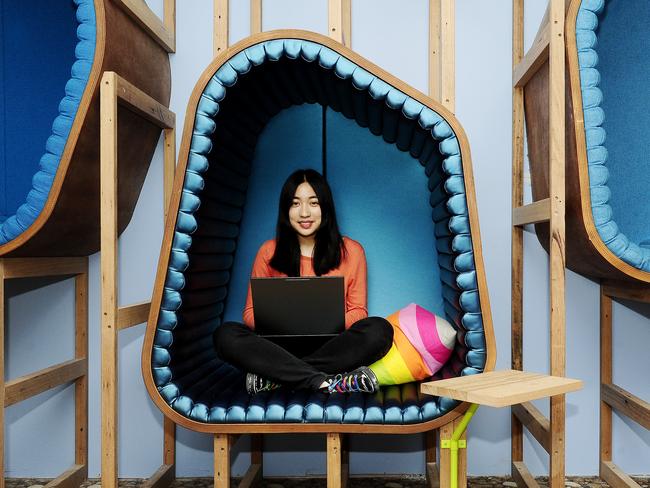Multiple interviews, psychometric tests and presentations common for job hunters nowadays
MARATHON interviews, gruelling tests, public presentations. Applying for a job is a full-time job these days. Here’s how tough it has become.
MULTIPLE interviews, gruelling psychometric tests, detailed case studies and commercially sensitive presentations. It’s enough to send anyone mad.
But it’s also standard process when it comes to getting a job nowadays as companies look to screen a multitude of applicants in an increasingly competitive market.
Recruitment company Randstad’s group director Steve Shepherd said interviewing had become much tougher as companies sought to understand how people would behave under pressure, rather than answer textbook questions.
“It’s not just skills and background it’s about competencies,” he said. “[It’s] much more savvy and behavioural questioning. On top of that we’re seeing things like role plays, exercises. It’s not uncommon for an assessment centre where applicants perform a range of exercises.”

Psychometric testing, case studies, presentations and reference checking are also key elements of the process as companies want to make sure they are hiring the right person.
“From a job seeker’s perspective it may appear you’re being put through the wringer... I don’t think any industry is necessarily worse. More and more companies are realising to get [top talent] and retain it, they’ve got to put more rigour into the upfront process.”
MORE: The truth about life on LinkedIn
One financial services worker told news.com.au they went through more than 20 interviews for an overseas-based role. It was part of a gruelling “consensus based” approach to hiring which involved meeting everyone they would work with on a day-to-day basis, including people on different continents.

“Everyone who will have something to do with you had buy-in,” said the worker, who didn’t want to be identified.
“In this case they claim it to be a proven process. They take it extremely seriously. Some people say it’s to wear you down. I don’t necessarily believe that... it’s very time-consuming.”
The 360 degree process is similar to that some companies use for promotions which can be based on feedback from current colleagues.
On the positive side, people had a good idea of the job and a circle of support before starting a role, however “there is definitely the risk that someone doesn’t like you” the worker said.
“If someone doesn’t really like you, they’re going to have to give a reason why. If one person doesn’t like you it could be all right. If it’s two you could be a goner.”

It’s not just finance companies that take the process seriously. Nicole, 22, applied for a social media manager role with a well-known travel company and went through a six-week process before finding out she didn’t get the job.
First up was a 20 minute phone conversation followed by a meeting with the head of marketing, then a presentation to be done within 48 hours and a final interview with three members of the board.
MORE: Is it time you asked for a pay rise?
Nicole used a day of annual leave and the weekend to prepare her case study. She said the process dominated her life for the entire six weeks.
“They’d call me and email me all the time, saying can you come in at 3pm? It all felt really last minute... it pretty much consumed my whole life for about two weeks.”
She narrowly missed out on the job, but the company still wanted to use her ideas to take to their clients. Nicole said no and now has a new job, but said the increasingly tough process was common among her friends looking for junior roles and even unpaid internships.
“The longer it drags on you know the closer you are to getting the job. You get your hopes up but then you feel like you’ve wasted your life. It was pretty disappointing when I didn’t get it.”

Gruelling interviews are also becoming more common overseas. Research from job website Glassdoor shows the average length of the interview process has grown from 12 days in 2010 to 23 days in 2013 in the US.
Consulting firm McKinsey & Company ranked the most difficult with the entire process taking 39 days. Thoughtworks, Boston Consulting Group, Rolls Royce, Bain and Google also took more than 30 days for applicants to lock down their new job.
MORE: Google hiring boss reveals simple tricks for job applicants
Job Advisor founder Justin Babet said no matter which way you looked at it, interviews were getting tougher. He said big companies like Deloitte received more than 6000 applicants for 400 graduate positions each year — so using an elaborate process to filter people was really the only way to narrow the field.
“Not long ago it was about ‘convenience and chemistry’ — now companies are focusing on things like capacity and capability, the ability to cope with things. The reason they do that is that the pace of business is speeding up and becoming more intense.”

He said multiple interviews and case studies were becoming more common as companies wanted to know how people coped in high-pressure situations. They were also interested in cultivating a culture of being “difficult to get in the door”.
“The harder you make it the more prestigious it is. You create an auto of ‘gee you have to be good to get in there’. If you’ve ever been for an interview and thought ‘that was a bit easy’ you don’t have a lot of respect for them.”
Google receives around 2 million applicants a year and has recently reduced its eight step interview process to around four.
MORE: Five personality traits that will get you promoted
Mr Babet said applicants for more specialised roles should expect more detailed interviews and researching the company was a bare minimum.
“The first thing you get asked is what do you know about the company. If you haven’t [researched] it shows you’re pretty disinterested.”
Applicants should prepare for behavioural questions which reflect skills like teamwork and conflict resolution.
It’s also essential to prepare an “elevator pitch” for when candidates get asked the inevitable “tell me about yourself”.
What’s the toughest job interview you’ve ever been to? Continue the conversation on Twitter @newscomauHQ | @Victoria_Craw | @JobAdvisorAU



